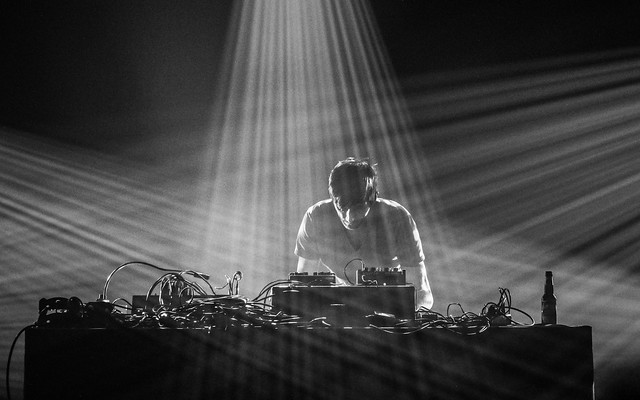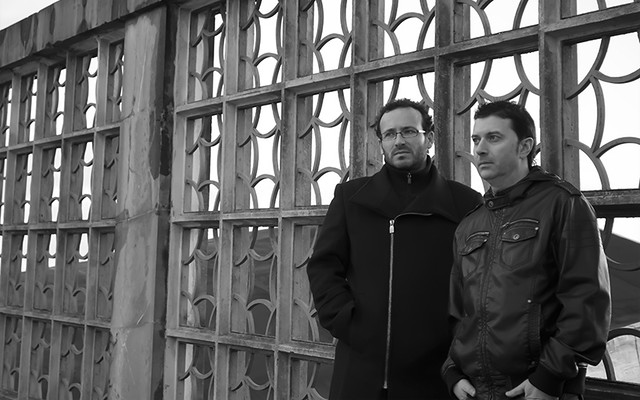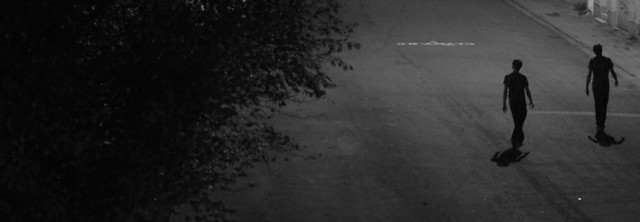Yves De Mey // Yves De Mey

Whilst releases on Opal Tapes, Modal Analysis and the legendary Sandwell District, have undoubtedly expanded Yves De Mey’s radius of influence in the last few years, the Belgium producer has in fact had a rather substantial career prior to this. Having produced Drum & Bass under the name Eavesdropper through the early 2000s, De Mey also has a long history working on sound for film and theatre projects.
These days however, his solo works are increasingly avante-garde, rich, evolving soundscapes, and sparse, gritty percussion a common feature. Alongside this, De Mey also produces as Sendai with long-term friend Peter Van Hoesen. The project see’s the pair take a no compromise approach to production, scrapping any ideas which both producers aren’t fully sure of.
With their latest LP, A Smaller Divide, released recently on the duo’s own ‘Archives Intérieures’ label, as well as a new solo EP entitled ‘Double Slit’ out via Semantica, we caught up with De Mey to talk discuss the recent projects, buying his first synthesiser, and the benefits of creative freedom.
Hi Yves, how are things?
Pretty good, a bit stressful this afternoon - I was making my schedule for the next coming months with all the studio work I have to do and things like that. There is way too much, at a certain point in my Google calendar there are three jobs at the same time which is impossible! We’ll be moving house in that same period so it’s going to be hectic for the next three to four months.
Better to be busy I guess! Are you touring much with the Sendai stuff?
Unfortunately not. It’s kind of weird because the Sendai album is out, but I have no idea about general reception to it. I hear from some people they really like it, other people say ‘wow this is heavy’, my girlfriend hates it - which is not too bad of course! So it’s weird and not many gigs announced – there’s one at the end of May at Nuits Sonores, which is a big festival and that’s basically it. Then for my solo stuff there is one in Paris in early May – that’s also about it! It’s alright though, it’s fun to play out but it also takes a lot of organization.
You play live with no laptop - just hardware right? I’m guessing that takes more organizing than just turning up with a bag of records.
Yeah, it’s pretty straight forward actually. When I started preparing my set I bought the gear to do the set. So everything grew together which means its not really stressful to do it now. It’s a bit more technical, but I feel much cooler doing it like this. The nicest thing about it is that I’m not watching a timeline anymore, I’m just listening to the sounds. Its pretty much laid out how I’m going to do my set, but I can play parts when I see there’s a good crowd reaction for instance, and I can stretch those parts and manipulate quite seriously. It’s nice, it allows me a lot of freedom and it’s really crash proof. The liberation from the screen is amazing.
When you’re producing is it a similar situation or is that more laptop based?
Actually, up until now it’s been more laptop based, but I always record long stretches of sound, like when I make a sound with my modular I do takes between fifteen and thirty minutes, then start editing afterwards. With the gear I’m using live I’m also thinking about a concept where I can go straight to hardware - maybe even making records without the computer. I’m not there yet because there’s a lot of stuff I love doing on the computer like pre-mastering. I’m a studio engineer anyway so for me, I’m trying to find the right balance between the two.
I put in my review that the ‘Double Slit’ EP reminded me of Autechre a bit – they’re really well known for having loads of variation, it’s kind of what defined them. I think it’s this method of working you mention that gives a similar, improvised quality.
That’s probably because I am recording these long stretches of sound with no loops. I’m just manipulating all the time, that’s the fun thing, I like the organic quality of it all. When I’m composing I find it really boring if I hear like eight or sixteen bars of the same thing. I also really like going into detail, for example making sure that each kick drum has a little variation in the EQ or whatever.
I must admit it is something I started doing after an Autechre concert I went to. It was around the Confield time so it must have been 2001. During that live concert not a single drum sound was ever the same - I was so impressed by that.
Was that when you were making more of the D&B style stuff?
That was probably around the end of my D&B frenzy! The last D&B thing I released was in 2000 or 2001. By then I was already getting more into the experimental stuff.
Initially what attracted me to that was the same thing that attracts me to music nowadays – full on energy and bass, that’s it, not even necessarily rhythm. I love rhythm obviously but I prefer more like, the sound quality of the bass and sheer energy in a track. In the good days of D&B it was there, the first releases on Ram Records for instance were amazing.
It’s interesting you say that, a lot of reviews of your work talk about it in the context of dance music, querying whether it’s danceable, but as you say it’s more about the energy to it.
Yeah, you go through a mindset that you try to impose on other people - they can still do what they want with it but I’m not a dance floor type anyway. I hardly ever go out, I quickly get bored in a club… It’s not that I don’t like the music but I don’t care about hearing a four to the floor beat for five or six hours. I’m more of a stay at home producer, my take on electronic music is how I probably would love it to be in a club - then I’d probably go out again!
Did you go to Atonal last year? A lot of the people playing there sounded amazing in that space on such a good system, but most of it you wouldn’t class as straight dance floor - People like Russell Haswell and Vladislav Delay were playing.
A very good example of that as well are Emptyset. I mean that’s my kind of dance. I might start tapping my toe to it, but usually it just puts a big smile on my face. That’s what I want, I don’t have to dance, I can just be there in the sweet spot of the sound and let it come over me, that’s enough.
I think the quality of all the producers we just mentioned is that they become the room, and the room becomes their sound and that’s what I really like about it. That’s also why I like playing live, you can go loud or whatever you want, there’s a few expectations but there’s no limits. You can go wild, not necessarily to torture people but it should be very physical I think – on the limit of torture maybe. On the other hand it’s a good way of showing your production skills, going loud but without doing any harm, its not just noise, it’s a way of delivering impact.
It’s also why I always loved My Bloody Valentine, they’re probably one of the only guitar bands I really love, I’ve seen them quite a few times as well. The first time I saw them was in 1992 maybe. It was amazing this wall of sound, especially during the finale of their concert. Everybody would be smiling but also with their hands over their ears! You get the feeling like you are standing next to a jet fighter as it goes off.
Speaking of guitar bands… I’m not sure if I should ask you this as the chances are its a Discogs error, but you’re credited on an album by a group called Dildo Warheads?
Oh yeah I played the organ! Dildo Warheads was a bunch of old friends of mine, my contribution goes back to when we were sixteen or seventeen years old. We had different bands, at a certain point all these fell apart and Dildo Warheads rose up from the ashes. (Laughs) But we stayed in touch and they were like ‘yeah we need an organ come play with us’. Then just for the recordings I played like stupid sixties organ kind of thing – that was it.
Would you say playing in bands was your first step into music?
No, my first step into music was much earlier, I bought my first synthesizer at the age of twelve. I started experimenting, then when I was fourteen or fifteen I met a guy who was very much into experimental music, very Cold Wave-esque kind of stuff and that was the kind of music I was listening to as well at that time. We started playing together each school holiday - we started recording together on a four-track cassette. It was pretty rough, very dark, wild things with a synthesizer and an old drum-computer but without any ambition - just enjoying ourselves and having a good time in the studio. That was probably my first real experience doing music.
And what about the film and theatre stuff you’ve done? How did that come about?
Actually I studied film - well I tried to study film! I went to three different schools in Brussels and with each I did the first year. Pretty soon it was clear to me that I was paying more attention to the sound for the movie projects we had to do than the actual movie itself. After the third year of trial and error at school I decided to go to work, and found my way into the studio. I started off as a camera assistant, photographer and video editor.
At a certain point someone was like ‘hey, you should do sound production as well’. The cool thing was that my boss in that studio said here’s a bunch of money, figure out a system that works for you and learn the trade’. So that was wicked, and so I started doing it.
Then after five years working there I get an offer from a theatre company to make music for them. I told my boss I was quitting and going freelance, and that’s what I did because I knew I had six months of work at that theatre company. It’s really a very romantic story in a way because it’s how it’s supposed to go I think. I couldn’t study for it so I learned myself which is nice, you make a lot of mistakes, interesting mistakes very often, and you just go.
One of the things I really liked with the Sendai project was that if you or Peter didn’t like something you were working on you’d scrap it straight away – it’s a total no compromise attitude to composing.
It’s like Peter said in that interview life is too short for stuff like that. If he came up with a track that he really likes and I don’t care about - he’s free to use it for his own stuff, but we actually have a tendency to just throw it away.
That’s also how I work with my own stuff, when I make a track and it doesn’t feel right I trash everything, sounds included. It’s probably why I like working with my modular, it has no memory - you can’t save any patches, it’s a very destructive way of making music.
Remixing do you find you have to change how you work much?
It depends on the original. I’m not snobbish about the modular, so if I do a remix and there’s nothing I hear in there that I need my modular for I’m not going to force it. I’m very picky about it when I do my own stuff but for remixes I don’t care, the only question for me is ‘in what way do you think you can make this track more your own?’
I wanted to ask about the SonuoS remix in particular, I really liked that one. How did that come about?
I’ve known Finn (Albertsson) via Facebook for a couple of years, because he’s pretty active – I think he’s the boss of Facebook in Scandinavia or something! (Laughs) It’s clear that he’s into music and we get along very well. I’ve never met him in person but it’s fun to talk and share ideas. At some point he was like ‘I have the opportunity to start my own label, would you mind doing a remix for me?’ and I thought ‘sure, sounds fun’.
Also I knew that Andreas Tilliander would do the mastering, and I’ve known Andreas for years already – it sounded like a nice setup, a bunch of people who know and respect each other and want to work together.
All the people on that label are new to me but all amazing. I saw you post about Martin Thompson’s SM-LL label as well who has also released on SonuoS.
Yeah Pokk - it’s amazing. I’ve been in touch a lot with Martin. I met him through his blog he’s doing, the sound per day thing with his Nord Modular G1. It’s because of him that I also bought a Nord Modular.
The cool thing about Martin is that he takes his time and he considers things a lot, and then suddenly he gets a bunch of tracks together and the results are amazing. I’m sure if he keeps doing this Pokk thing it’s going to work.
With your own label, the Archives Intérieures what are your plans there?
The first Sendai was released on Time To Express and it must have been quite a shock for people who buy Time To Express stuff because it’s straight forward techno, then all of a sudden there’s this Sendai Geotope album and it’s not dance floor. We thought since Time To Express has this history as a techno label it makes more sense to do something else to release experimental stuff. It took us a while to get to the idea of this Archives Intérieures thing - it was ideal for us to release our own stuff, but we’re also going to release other artists now. The next artist is going to be John Elliot from Outer Space, we’re doing a CD reissue of a vinyl album he did a few years ago - that should be out in June. Then there is another artist whose name I can’t mention yet – that’s will be for September.
There’s no pressure we just want to keep a steady pace and release every three or four months. The whole thing is this idea of building an Archive, that’s why the artwork is always kind of similar - it’s this feeling of a series. It’s not just a CD-only label - a lot of people think its just CDs, but there’s going to be vinyl for sure.
What’s the plan for your own productions this year?
There’s going to be a remix out soon, then at the end of June / early July there’s going to be a four track EP which is a bit more dance floor, it’s pretty heavy. It’s pretty intense and the guys from the label were like ‘make us something techno’. I was supposed to make four tracks but ended up doing seven and then throwing away the first three – they were too techno for me, by the time I was transferring the files I was already bored of them.They were very supportive, but also very honest, and I appreciate honesty.
We’re also working on a new Sendai as well, that should be finished very soon, it should be ready in six or seven weeks - A four track EP as well. Then there’s two other labels who’ve asked me to do stuff for them, getting me out of my comfort zone again. There’s no date set for that as it still has to be made but when I think of it, I’m pretty busy until the end of the year.
- Published
- Mar 27, 2014

